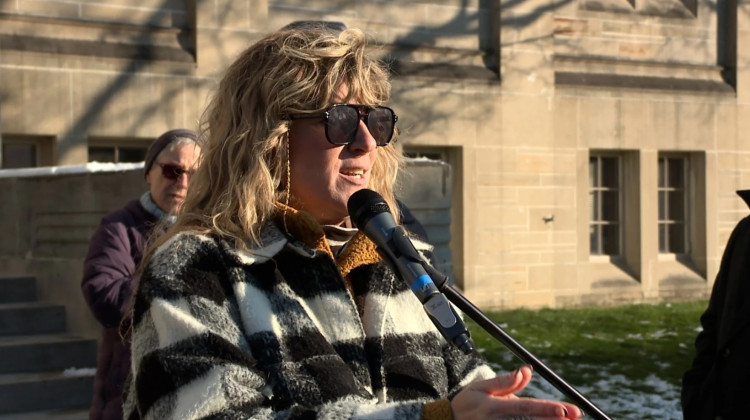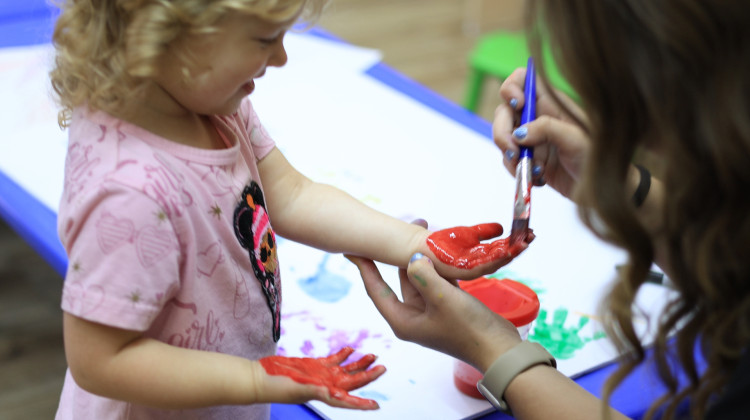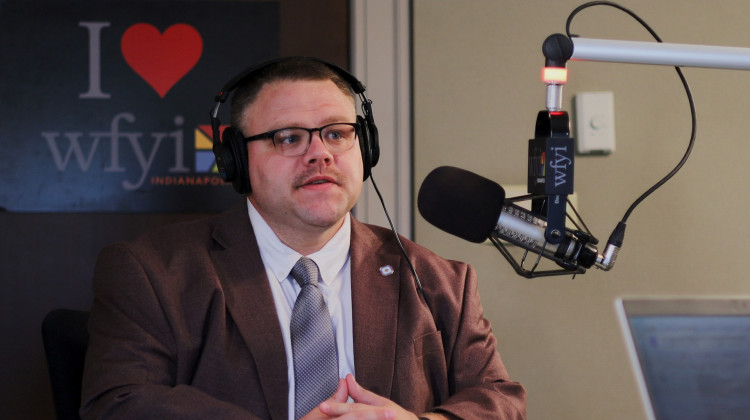
8th Grade Teacher Sarah Medve and Director of Student Engagement Kendall Price at Thomas Carr Howe Community High School
Emily Cox/WFYIThe Indiana program 21st Century Scholars offers up to four years of college tuition for low income students. This year’s deadline is fast approaching, but most eligible students may not apply.
Sarah Medve is an eighth grade mathematics teacher at Thomas Carr Howe Community High School. Almost all of her students applied to be a 21st Century Scholar.
“I kind of pitched it to them as like looking at the scholarship form as a $40,000 piece of paper,” Medve says.
But that is unusual. The most recent data shows less than half of eligible students apply. Of the eligible students now going into their junior year of high school, 46% applied.
A number of factors contribute to this, but Medve says a big one is that students must sign up in middle school because the program prepares you for college.
“I think it's just sometimes hard for eighth graders to visualize that money coming into play four or five years from now,” Medve says.
And some young students don’t hear about the program. Director of student engagement at Howe Kendall Price says others think they automatically qualify and don’t apply.
“It’s so disappointing when I have to turn students away who come down to my office and always ask, well Mr. Price, am I a 21st Century Scholar,” Price says. “And, when I look in our scholar track system, I have to tell these students that they're not, because their parents didn't obviously sign them up.”
All students who do sign up get in the program. The only qualification is income eligibility.
Then in high school, 21st Century Scholars participate in the Scholar Success Program. They learn things like how to fill out student loan paperwork, how to find scholarships and how to apply to schools. Students complete three of these lessons each year of high school.
Barbie Martin, Director of School and Community Outreach for the Indiana Commission for Higher Education, says all high schoolers should learn these skills, not just 21st Century Scholars.
“All the money in the world is not going to help if they don't know what to do when they get to college, or they don't know who to turn to with questions and things like that,” Martin says.
According to the Indiana Commission for Higher Education, 86% of 21st Century Scholars go to college right after high school, compared to 63% of students in general.
Once enrolled, if they complete the program at an approved Indiana school, they remain eligible for the scholarship—even when their paths aren’t traditional.
Cayden Brewer’s mom applied for him when he was in middle school.
“It's really one of the most thoughtful things my mom has ever done for me,” Brewer says.
After health issues caused him to drop out of school, he wasn’t barred from the program. You are only dismissed if you do illegal activity including drugs, if you earn less than a 2.5 GPA, or if you don’t do the program activities. Students verify that they still qualify their senior year of high school.
Brewer eventually finished at an adult learning center, the Excel Center, and is now a sophomore at Ivy Tech in Indianapolis.
He says he wouldn’t have continued school if he wasn’t a 21st Century Scholar.
“When you think of college, it's always kind of like, well, you're going to have to take out loans, you're going to have to go into all kinds of debt. And then you just kind of stand it for the rest of your life,” Brewer says.
The deadline for this past year’s eighth graders to apply is fast approaching—but earlier this week Howe reported a nearly 4,000% increase in applicants—from two students to more than 80. That number could still go up.
Statewide data is not yet available, but Martin from the Commission for Higher Education says she hopes all eligible students will apply, even if they don’t plan to go to college.
“If you don't use the scholarship, if you don't end up going to a traditional school, that's fine,” Martin says. “There's no penalty if you don't use it. But if you change your mind as a junior or senior in high school, you can't go back and apply at that point.”
At Howe, Price attributes this year’s surge in applicants to promoting the program in school and sending email blasts to parents, and he says students encouraged one another to sign up.
“I had students coming down to my office, so the peer pressure was there, you know, too as well to say, hey, Sarah, I need you to sign up, because I'm getting ready to sign up—or I got my paper in, did you get your paper in,” Price says.
Price says students should think about their future.
“These things will also help further your career and obviously puts you in a position where you could be very, very successful not only in school, but life after school, as well,” Price says.
The deadline to apply online is Sunday June 30.
 DONATE
DONATE









 Support WFYI. We can't do it without you.
Support WFYI. We can't do it without you.